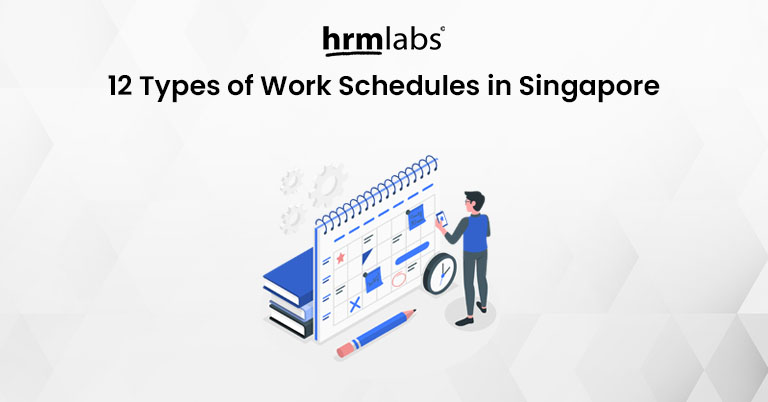Singapore’s vibrant work culture is fueled by its diverse economy, which has led to an equally varied types of work schedules. Whether you’re managing a retail team, running an office, or supervising shift workers in healthcare or hospitality, different types of work schedules come into play. Understanding these schedules not only helps businesses stay organized, but it can also improve productivity, employee satisfaction, and compliance with labor laws.
So, let’s break down 12 common work schedules in Singapore—some of them you may already know, while others could surprise you!
Full-Time Schedule
The most straightforward work schedule is the full-time schedule, typically requiring employees to work 40-44 hours a week. In Singapore, the Ministry of Manpower (MOM) stipulates a maximum of 44 hours per week before overtime kicks in. Full-time work is commonly found in sectors such as finance, education, and government.
Part-Time Schedule
Part-time work involves fewer hours than full-time employment, often offering flexibility for employees. Under MOM guidelines, part-time employees in Singapore typically work less than 35 hours a week. Part-time roles are increasingly popular in sectors like retail, F&B, and gig economy jobs.
Shift Work Schedule
Shift work is essential in sectors like healthcare, manufacturing, and hospitality, where services must continue 24/7. These schedules are divided into morning, afternoon, and night shifts. Shift workers in Singapore are protected under the Employment Act, which outlines rest days and compensation for night shifts and public holidays.
Split Shift
A split shift breaks the workday into two or more segments, typically with a long break in between. This is common in F&B businesses where peak times fall around lunch and dinner, while the afternoon may be quieter. Split shifts can help maximize staff efficiency during high-demand periods.
Rotating Shift
In this schedule, employees rotate between different shifts over a set period, ensuring that all staff experience both day and night shifts. Common in industries that operate around the clock, like transportation and security, rotating shifts offer variety but can be challenging for employees adjusting to constantly changing sleep cycles.
Compressed Workweek
A compressed workweek allows employees to work longer hours over fewer days. For example, an employee may work four 10-hour days instead of five 8-hour days. This schedule is ideal for those seeking a longer weekend or time for personal commitments while maintaining full-time status. It’s increasingly popular in corporate settings, particularly among companies promoting work-life balance.
Flexible Work Schedule
Flexi-work allows employees to choose their start and end times within agreed limits. This flexibility has become more common in sectors like tech and finance, especially post-pandemic, where many businesses adopted remote or hybrid work models. Flexible work schedules boost morale and improve work-life balance.
Remote or Telecommuting
Remote work schedules allow employees to work from home or any location outside the office. The rise of remote work in Singapore, particularly in industries like IT, marketing, and design, has made this an increasingly preferred option. With robust communication tools, remote work schedules allow for collaboration even when the team is geographically dispersed.
Freelance or Gig Work
Freelancers and gig workers enjoy a high level of flexibility, choosing when and how much they work. This type of schedule is becoming more common in Singapore’s freelance economy, especially for creative, tech, and consultancy roles. However, managing time effectively is crucial, as there are no set hours.
Overtime Schedule
In certain industries, overtime work is inevitable, especially during peak seasons. In Singapore, employees covered under the Employment Act must receive 1.5 times their hourly rate for overtime. While this isn’t a schedule in itself, it’s essential to consider when calculating employee wages.
Seasonal Work Schedule
Some businesses in Singapore, such as those in tourism, retail, and agriculture, require seasonal workers to cover peak demand periods. For example, extra staff may be hired for the year-end holiday season or during large festivals like Chinese New Year. Seasonal schedules allow businesses to ramp up operations without committing to long-term hires.
Job Sharing
Job sharing allows two or more employees to share the responsibilities of a single full-time position. This schedule is ideal for employees who want part-time hours but still want to contribute to a full-time role. It’s a less common arrangement in Singapore but can be particularly useful in sectors like education and non-profits.
Managing Work Schedules the Smart Way
With so many different schedules in play, managing them can quickly become a logistical nightmare—especially when tracking attendance, shift swaps, and overtime. That’s where a robust attendance management system integrated with payroll, like HRMLabs, comes in handy.
HRMLabs helps you:
- Automate attendance tracking: No more manual spreadsheets! HRMLabs records clock-ins and clock-outs digitally, reducing errors and saving time.
- Easily schedule shifts: Create and manage shifts with ease, ensuring coverage while keeping employees’ needs in mind.
- Integrate payroll calculations: HRMLabs automatically calculates work hours, including overtime, and integrates these with payroll, making sure your employees are paid accurately and on time.
- Stay compliant: Ensure your schedules align with MOM regulations on work hours, rest days, and overtime, reducing the risk of costly compliance issues.
With HRMLabs, juggling different work schedules becomes seamless, leaving you with more time to focus on what really matters—growing your business. Whether you’re managing full-time employees, shift workers, or freelancers, HRMLabs ensures your HR processes run smoothly and efficiently.
Conclusion
Work schedules in Singapore are as diverse as the industries that drive the economy. By understanding and effectively managing these schedules, businesses can create a more efficient, satisfied, and engaged workforce. Ready to simplify the way you manage work schedules? Let HRMLabs help you take control of attendance, payroll, and compliance in one integrated platform.


